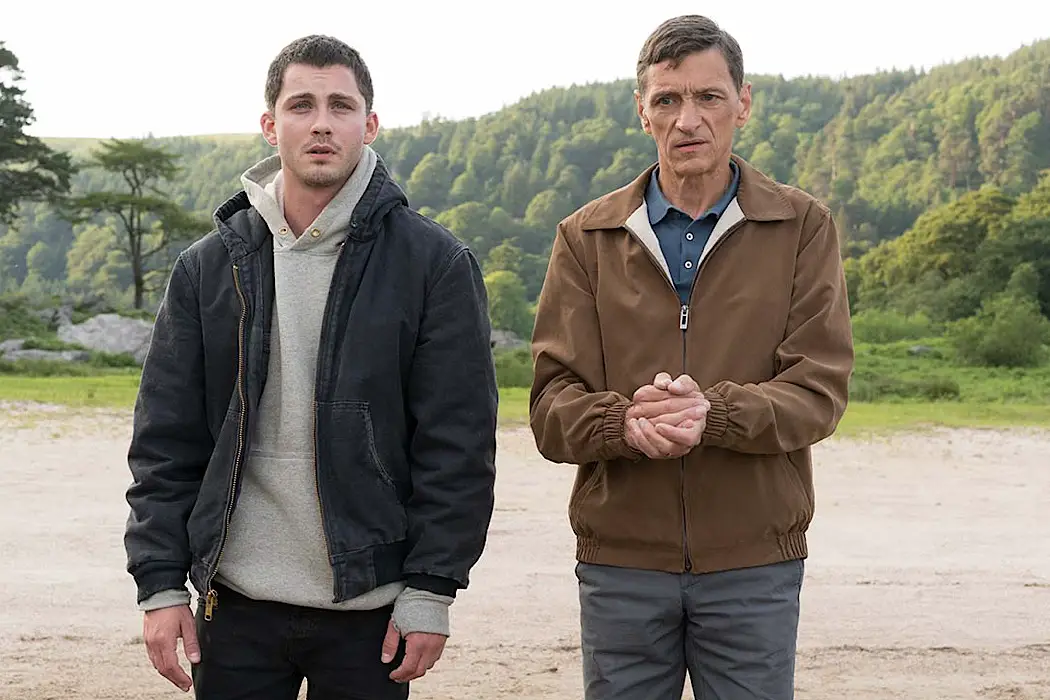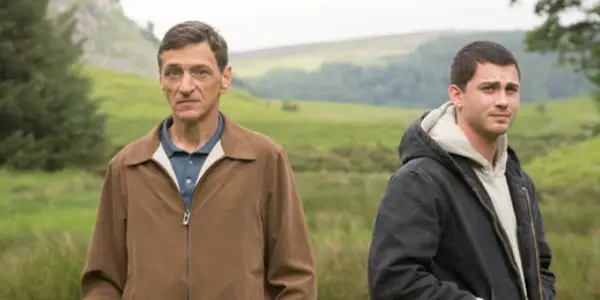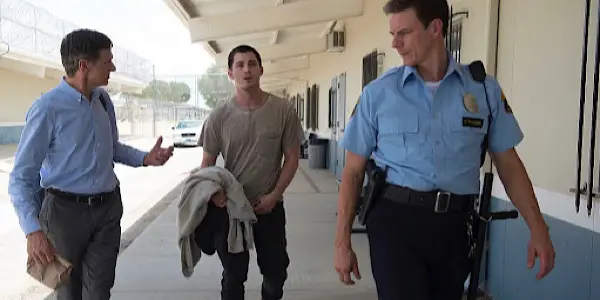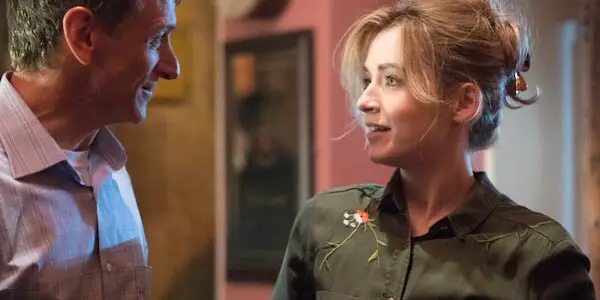“I Just Love A Good Story.” Interview With John Hawkes, Star Of END OF SENTENCE

Kristy Strouse is the Owner/Editor in Chief of Film Inquiry,…
End of Sentence is the feature debut by Elfar Adalsteins, an endearing father-son film that has a surprising amount of humor and an ample portion of heart.
When Frank Fogle (John Hawkes) loses his wife, he asks his estranged and newly released from prison son, Sean (Logan Lerman) to help him fulfill one of her dying wishes. This begins a reluctant trip to Ireland and an even longer journey to finding and understanding one another. The story moves with an easy, light tempo, despite some hard-hitting emotional undercurrents.
When they arrive in Ireland nothing comes easy. New acquaintances, past wounds, and new details about the wife he has lost begin to turn this already challenging dynamic into overdrive. Throughout the film, we truly get a sense of these two characters, both very-well matched by Lerman and Hawkes, creating a chemistry that is ripe with angst and love. The screenplay by Michael Armbruster is one of a somewhat predictable nature, but it doesn’t matter in the slightest. The dialogue is honest, engaging, and the two stars bring it to life in a truly joyful fashion.
While the notion of a troubled father-son bond isn’t necessarily breaking new ground, the powerful performances make it a feature that’s bound to entertain, be thought-provoking, and perhaps provide some catharsis. It’s about reconciliation and finding ourselves, and one another, through experience, pain, and patience. A truly wonderful film; one of the best I’ve seen this year. Seek it out.
I was able to speak with star John Hawkes about his first impressions, and his connection with the character and story. As a fellow bookworm he also includes some suggestions as we self-distance:
Hello, this is Kristy Strouse with Film Inquiry. Thanks for talking with me today. How are you?
John Hawkes: Good, and what about you- everything’s okay, you’re feeling well? Your family?
Yes, I am, and thank you for asking! My family’s doing well, I hope the same for you.
John Hawkes: Yes. Very happy to say so.
That’s great. How are you doing with everything?
John Hawkes: I’m okay, I have a weakness for books. It is kind of an ideal time for a vaguely agoraphobic bookworm, so I guess it works out pretty well [laughs]. But there’s a lot of sadness of course too, and missing a lot of the blessed ordinary of things that were easy to do before or possible to do before. As far as people and travel and things like that and work. So, I miss those things but I’m trying to, I guess, always be happy with what’s happening on some level. I mean, I’m lucky to have food to eat and a place to live and clean water and it could be worse.

Oh, absolutely. Trying to look at the positives is always a good thing!
John Hawkes: I mean there are all these cliches you know but some of them turn out to be true and when you live long enough you just realize its a better way to be sure.
I agree. And I gotta say, you know, I’ve been a fan of yours for a very long time. So, it’s an honor to talk to you.
John Hawkes: Oh good! It’s my pleasure. Thank you!
And, I enjoyed the film.
John Hawkes: I’m really glad you did. It is really dear to me, this one, I really, I really like this movie a lot.
It’s great! So, what was your feeling when you first read the script, what appealed to you?
John Hawkes: Gosh, it’s been a little while. But three things kind of have to happen when I read a script. The first thing is that I have to love the story that I’m reading and then I have to love the character that I may get to play. The third thing would be that I would want to be surrounded by really great people telling that story. So, those things must be in there but I think the script itself just drew me in. Michael Armbruster, the screenwriter, is fantastic, I changed a little probably as we shot it, but the basic story was there and I just… I loved the characters and I loved the fish out of water idea. The Americans in Ireland as well. I guess beyond that when I met with Elfar Adalsteins, the Icelandic director. I met with him and he seemed like such a lovely gentleman. Then I looked at Elfar’s short film called Sailcloth starring John Hurt.
That was just beautiful. So, you want to be around someone who you feel, even if they haven’t made a feature film before, that you feel can tell a story and I really felt that Elfar could. It turned out to be true! Couldn’t have been a kinder gentleman as well, so it is pretty great.
Yeah, and I love the script I think it’s a huge part of it. One of the things that I loved about the film too was the relationship between the father and son. It was almost felt like kind of a role reversal a little bit. I felt.
John Hawkes: Interesting! You see Frank more like the child in a way? Maybe power-wise as well?

Yes, at least to start, and he does change throughout the film, they both do. It’s just an interesting dynamic between them.
John Hawkes: For sure, and you know Logan [Lerman] is a really fine actor and one thing that I loved is that, like myself, and LVaar was welcoming of this, we’re both kind of people who care about the story as a whole. With Logan I feel like he has kind of a director’s mind as well and so, the three of us made it less about “Here’s my part, here’s your part and you’re the director.” It was just organically more a trio, and we knew how to make it most effective. A lot of that was done before we would get to set.
A wonderful thing about working on location is that we’re all kind of stuck together, and so every Sunday we would get together and meet for a couple of hours and have a bite to eat, but we would look really seriously at the week’s work ahead and kind of ask a lot of questions. We didn’t always have many answers, but that was fine, we would progress as far as how to lay out the story.
So, if there was collaboration did your character change a lot?
John Hawkes: It’s really there in Michael’s script for sure. But, there are so many ways that you could approach it, I suppose, and then execute it- as far as each scene and how the characters play it-so I guess that there was certainly a ton of collaboration. It is more about, I think, the details. The basic skeleton was there, but yeah it’s just how do you tell it? How do you all agree? When you can, you go with that approach.
It makes sense and seems like efficient practice. Did you identify with the character at all?
John Hawkes: Yeah, you know, in a strange way I did. I didn’t want Frank to be a complete kind of Poindexter and it’s interesting because I think he’s a complex guy and I was able to bring, I think, some layers to him. Hopefully, ones that were surprising and real. You know David Milch, our Deadwood creator would always say “Human beings, we’re mysteries to ourselves” and I think that there’s a lot of truth to that and so I like when a character does things out of character, and I try to never say that my character wouldn’t do that because I feel like we’re very complex beings, all of us in real life, and why not try to bring that to art as well? I like Frank. I feel like there’s a real decency about him.
And then you find out he is a real survivor, a hard-working guy and you know he tells his son the statue allegory, you know sometimes you are the pigeon and sometimes you are the statue idea, which is an interesting way to look at life. But underneath that kind of strained calm and the decency of Frank, you know he’s got some pretty terrible secrets. He fights to suppress memories and so there’s a lot underneath that kind of decent exterior which is real. There is also a great deal, I think, of anger and grief, frustration and rage. That’s an interesting person to play. Someone who is trying to hold it together but doesn’t have all the tools, exactly. He is pretty good though, he holds it together pretty well. There’s a lot going on.
Yeah, there definitely is and that’s a terrific answer. I think there’s a lot of nuances and layers to his character for sure. You capture them very well.
John Hawkes: Yes. And Logan has the more straight-ahead route but there is a lot of surprise within him as well.
Absolutely. He’s great too, and how each character deals with the same type of abuse, is very interesting.
John Hawkes: Yes! In different ways, yes.
So, you know, you’ve done a lot of different kinds of roles. You are a bit of a chameleon I’d say! You’ve played a whole spectrum of characters. What do you look for when you’re choosing a role, is there something in particular?
John Hawkes: You know, I think that I just love a good story. I’ve always loved stories and, being just a lifelong reader and consumer of film and television. Even though I grew up with just one channel, in Minnesota, in a pretty rural area and didn’t have a ton of media around. I guess that’s what lead me to books so much, but again I’m just looking for a really, really good story and a character that matters to that story. One that feels like someone I’d like to be, or someone I’d like to pretend to be, and its kind of as simple as that.
I come from a theater background and worked in Austin, Texas, with a really great theatre company when I was in my late teens and early 20s and got to play a lot of different characters. I guess I always loved those kinds of actors as well. People who had range. I remember, there is a TV show called Barney Miller, it was about cops but it was kind of funny and felt kind of real and it was almost all in the station house…they very rarely even the left that house, but what I loved was that there were actors that I would remember from other episodes that were completely different villains, or criminals or whatever. That’s where I first kind of saw that and it stood out.
If the story is important to you, do you also want to challenge yourself?
John Hawkes: I don’t much think of it that way because it’s all a challenge. Every time you step on a stage or get in front of a camera it’s an immediate thing. The audience believes you the second they see you when you step on stage, or the camera finds you the first time and you have to cultivate that belief. But as far as to challenge, I think that just comes with the character and the story inherently. Any good story, any good character will be a challenge to play.
I never would want to begin a movie and say “well this is just like the thing I did before.” You know? I don’t ever want to do it that way, so I always try to begin every project just by admitting to myself that I don’t know how to do this. You just begin to ask questions and figure out how to. That’s more fun than just saying “if I twirl my mustache or raise my eyebrow or whatever like I did in this other guy before.” I think it’s a more organic approach, and most certainly a more enjoyable one to start from a point of innocence, every time you are going to tell a story.

Yeah, I can see that. Is there any kind of film or a TV genre that you haven’t done that you have always wanted to?
John Hawkes: I don’t think about it that much, you know, and I get asked that question a lot, and I’m always kind of stumped. It’s not that I feel I’ve done everything or a lot. It’s just…you know it when you see it. That is how I feel. Something that strikes you for whatever reason, or it doesn’t. I want originality. I don’t so much want to participate in something that I feel I’ve done before or I’ve seen a lot before. I mean, I don’t know, it’s hard to say, what makes you want to get out of bed and excited to go to work? You need to think about that with roles.
I understand. So, you mentioned that when you were younger you lived in a rural area (which I know all too well myself) and didn’t have a lot of viewing options. Did you always want to be an actor?
John Hawkes: Oh no…no. I come from a small town and I loved a couple of shows on TV. Only a few films, we would go to the drive-in theater now and then or there would be one on TV late night and I always thought that it looked thrilling. It interested me, like, what those people were doing, what actors were doing. There was something about it that was beyond kind of a Hollywood idea, it just looked like a really great job. And I wondered and figured that people probably got paid to do it. But, you don’t really know when you’re young, and I had no references for how to approach being an actor. There were no role models or anything but when I got a part in a play in high school, I just loved it. It was a tiny part, but it never stopped after that. I wanted to do more.
What was the play?
John Hawkes: The play was “You’re a good man Charlie Brown” and I played a character that’s not even in the play. It wasn’t even a proper stage, but those involved were wise enough to kind of flesh out the cast to make sure that the songs could even be heard in that echo chamber. So I played Pig Pen, I had only two lines and the interesting thing was that I’d never been in a play. I also wasn’t a great sleeper in those days, I would lay in bed at night and just recite the whole play and every song. Every lyric every, every person’s line that you either said or sang. I could lay in bed and do the whole show [laughs]. I don’t think I could ever do that now but looking back its such a sign of “this is where you are supposed to be.” I feel like I’m kind of rambling now.
Oh no, not at all. You’re giving terrific answers.
John Hawkes: Oh good, it is like a photographer showing you on this digital camera “No. This is not a terrible photo session, These are gonna be great headshots, look.” [Laughs]
[Laughs] True, good comparison. You really are, and I appreciate it. Is there anything with this film that you’re hoping people will take away from it?
John Hawkes: Oh that’s interesting. The main thing that I want to do when trying to write something… And you know, I don’t write a lot for public consumption per se, but I write songs and other things. I’m a creative person. The one thing that I’m most interested in would be connection. And that’s a pretty general term, but it would be to just connect with another person. I feel like this might be a really interesting thing to see during this period. I always hope that a father and son, who’ve been holed up, will watch the movie and find it a salve or balm somehow a bit. But I also think on a larger scale that the movie is really about acceptance. I feel like it’s a good time to be reminded to grow stronger in our acceptance.
So, people will be entertained I think because there’s a lot of humor in the movie and a lot of humanness. Hopefully, people will see themselves in it somewhat feel a little less alone. Maybe just learn a little from it. I don’t think films are necessarily our great teachers or whatever they can be, but depending on how we relate to them they can be influential. I hope that people will think and just connect with it and feel something, and hopefully be a little more accepting of themselves and the people around them. That’s what I am always looking for.
I think that’s absolutely true. I think the film is about acceptance of yourself as well as the relationships we have.
John Hawkes: Yeah and we probably all have a low level, kind of simmering grief, even if we don’t kind of feel it or unease and I feel like this movie deals with those things as well.
It does for sure. And it’s also a very funny, honest depiction, I really appreciated that about the film. Before I let you go, since you’re an avid reader, any book suggestions you’d like to share? New discoveries or favorites our audience might enjoy?
John Hawkes: You know, I’d say that I really just read, Erik Larson‘s new book which is like a microscope, it’s very detailed, but I just chewed through it. That one’s called “The Splendid and the Vile”. And that’s a book that’s basically about the Blitz of London and it’s just one year in Winston Churchill’s life. We’ve had a couple of rough months, for sure, but it’s such a great way to gain perspective when you see a whole city laid siege and somehow just continuing to go on, keep calm and carry on. It might seem cliche, but that was a great very entertaining thing to read. He’s such a great writer… “Devil in the white city” is one of my favorite books.
I would mention on the other side is Amanda Petrusich, She wrote a book called “Do not sell at any price” that was written some years ago. That’s a book about the world of record collectors, and she ends up becoming a part of that world, against her better judgment. Really a terrifically written book, I love records. But yeah, there’s just a million of them. I love Michael Ondaatje’s fiction, I just read “The cats table”. We can stop there. [Laughs]
I love it! It is like a John Hawkes book club.
John Hawkes: If I was better on the internet I can join up on one! I am not too computer savvy, this would be a good time to be more tech-savvy, I suppose. I am learning.
I understand. I believe Devil in the White City was/is supposed to be adapted. I think that could be great.
John Hawkes: Really? Why! Come on Kristy! [Laughs] How could you even make that? When a piece of artist is so perfect I don’t like if they remake it into another piece of art. But no, it’d be cool. I would probably watch it but isn’t the book always better than the movie? There’s the story of Alfred Hitchc*ck‘s editing room and there was a large New Yorker cartoon blown up and framed and it was two goats on a refuse pile and one of them’s chewing on a spool of 35-millimeter film and the caption says, “I liked the book better.”
[Laughs] Oh, it is tough to get right. I agree!
John Hawkes: Just like I wouldn’t want to see a great movie adapted into a book.
True, but this one could be intriguing.
John Hawkes: Yes, of course, intriguing, but it’s just so hard. Into the wild. It’s one of the few books and films that seemed to work so separately well. Mr. Penn took it and he didn’t just make the book.
Yeah, that’s a lovely film. I try to look at them separately often but it can be hard to separate.
John Hawkes: Yeah, well, good for you! I am just a closed-minded old fart, [Laughs] I am opinionated on these things.
[Laughs] You don’t seem close-minded at all!
John Hawkes: Oh, I’m just joking, but I do have a set in my ways thing, certain friends might say I can be stubborn or I will always bitch about a movie being made, I don’t know [Laughs]. What does it matter anyway? It’s funny really.
True! Well, thank you so much for the talk. Congratulations again on the film and another great performance.
John Hawkes: Thank you!
Film Inquiry would like to thank John Hawkes for taking his time to talk with us.
Watch End of Sentence
Does content like this matter to you?
Become a Member and support film journalism. Unlock access to all of Film Inquiry`s great articles. Join a community of like-minded readers who are passionate about cinema - get access to our private members Network, give back to independent filmmakers, and more.
Kristy Strouse is the Owner/Editor in Chief of Film Inquiry, writer, podcaster, and all around film and TV fanatic. She's also VP of Genomic Operations at Katch Data and is a member of The Online Association of Female Film Critics and The Hollywood Creative Alliance. She also has a horror website: Wonderfully Weird & Horrifying.













